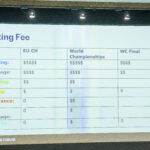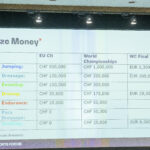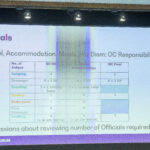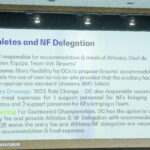Session 4 FEI Championship Review
30th of April, 9 – 12:15
As journalists and photographers, championships are often the epi-center of our work covering equestrian sport. A lot of work goes into the category pre-, during- and after a championship event. For quite some time very few organizers bid for championships. The first session of the second day of the Sports Forum evolved around this topic, the why’s and hows and what to do took the first half of the day.
”Houston – we have a problem” – Áine Power is Deputy Legal Director and she started out her introduction in this manner to a full auditorium although the many blazers with the FEI emblem were prominent.
“We like, as our president said yesterday and Sabrina mentioned, our critical friends. They’re very important to helping us do better.”

The crux of the matter is that FEI has a lot of championships, in 2024 there are 28 in the calendar.
Championship cycle is the rotation of major and minor championships, with championships being held annually, every 2 years, and every 4 years. The World Cup finals, the youth championships, and the young horse championships are the ones that occur annually.
Áine Power posed the very relevant question:
“What do we want, is the cycle still relevant”
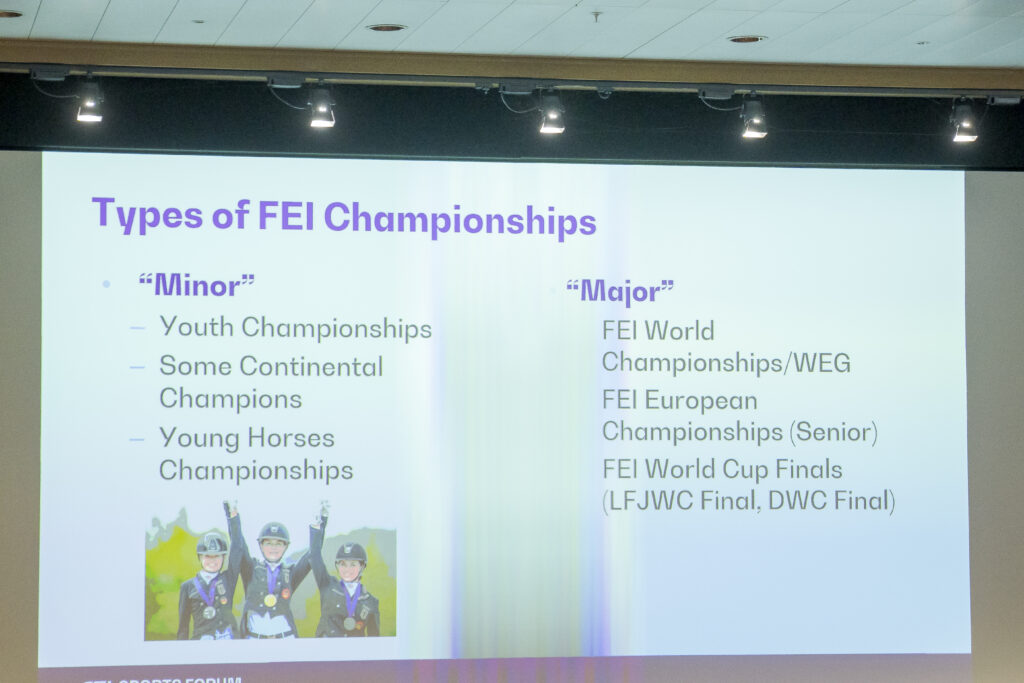
Divided into minor and major championships.
All championships have a bid process, require FEI board allocation, a host agreement with FEI – OC and NF as well as FEI HQ involvement. FEI does not perceive a problem with the minor championships and the session at the sports forum only covers the major championships.
Although the bid process is very formal FEI can engage in informal discussions with different national sport bodies like Sport Denmark and its likes.
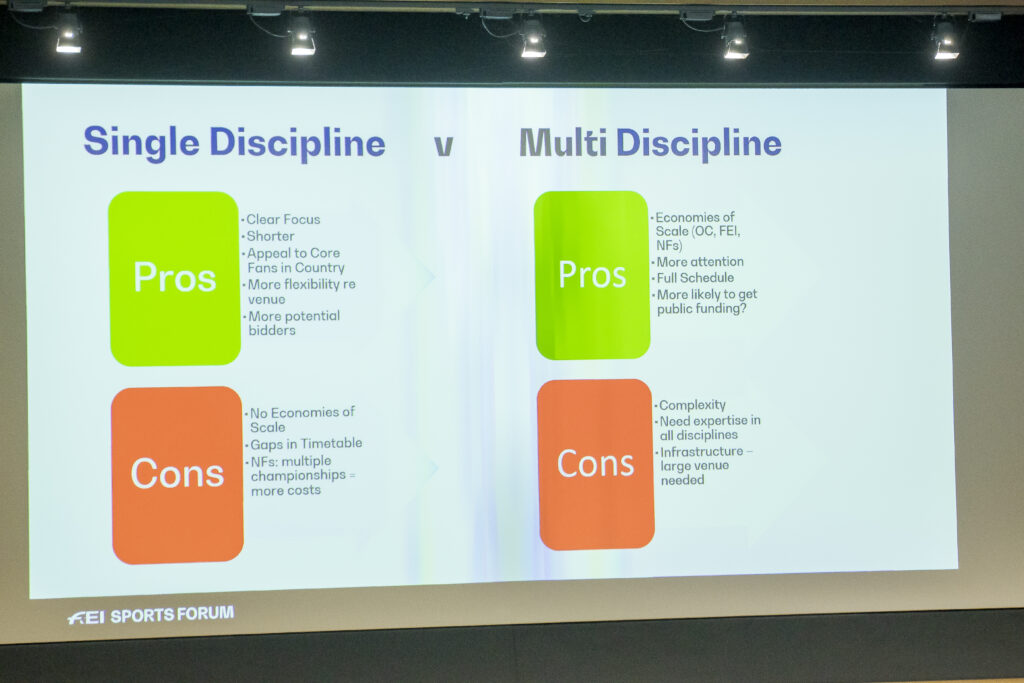
The bid process is fairly straightforward, the host agreement is vital for Áine Power, Deputy Legal Director, it is her favorite time of the year.
All bids have to be supported by the NF in the country, it does not mean they have to be financially responsible. Currently, the trend is that only endurance often receives several bids. Usually, only one bid comes in for championships in other disciplines.
Áine Power stated:
“At headquarters, we feel that there is a reluctance to place bids for championships.”

What are the requirements – what cost does the OC have to cover
- The hosting fee covers FEI HQ costs, and the popular discipline = jumping funds the rest
- Prize money, follows the same pattern
- Officials, very different between disciplines, host cover travel, accommodation, meals, and per diem, under review
- Athletes and NF delegation, OC responsible for Accommodation and meals,
- FEI delegation and Pre Visit,
- The host broadcaster, OC responsible for cost appointing Host broadcaster, FEI retains broadcast right
- Sport Specific requirements, infrastructure requirements, timetable constraints
Opportunities for the OC, NF, and country
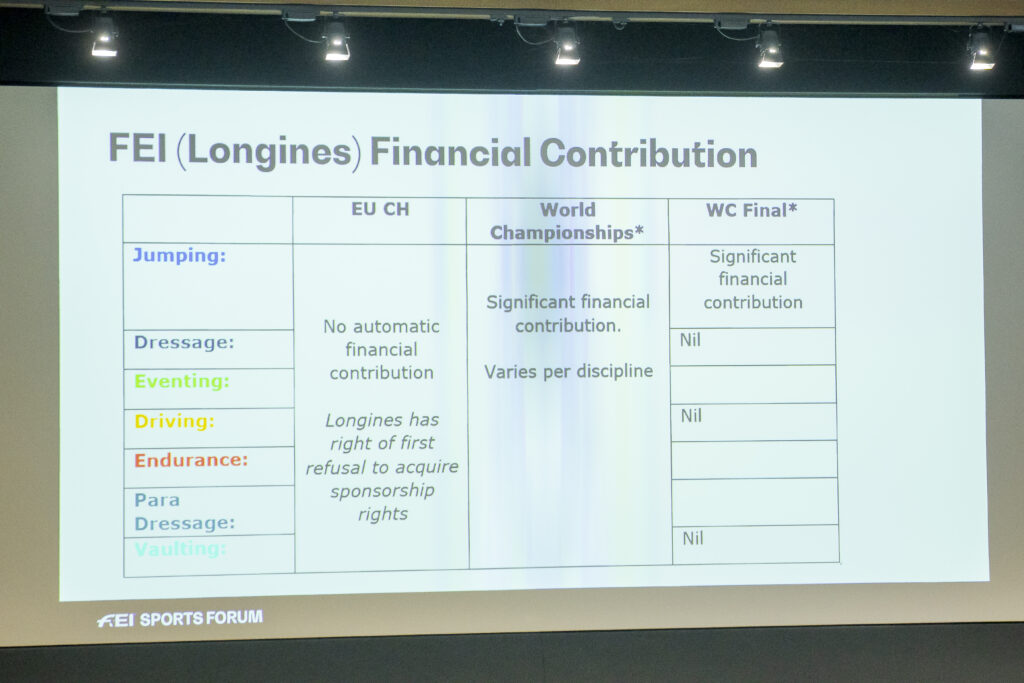
Sponsor Longines gives financial contribution in jumping for the World Cup final and for world championship for all disciplines.
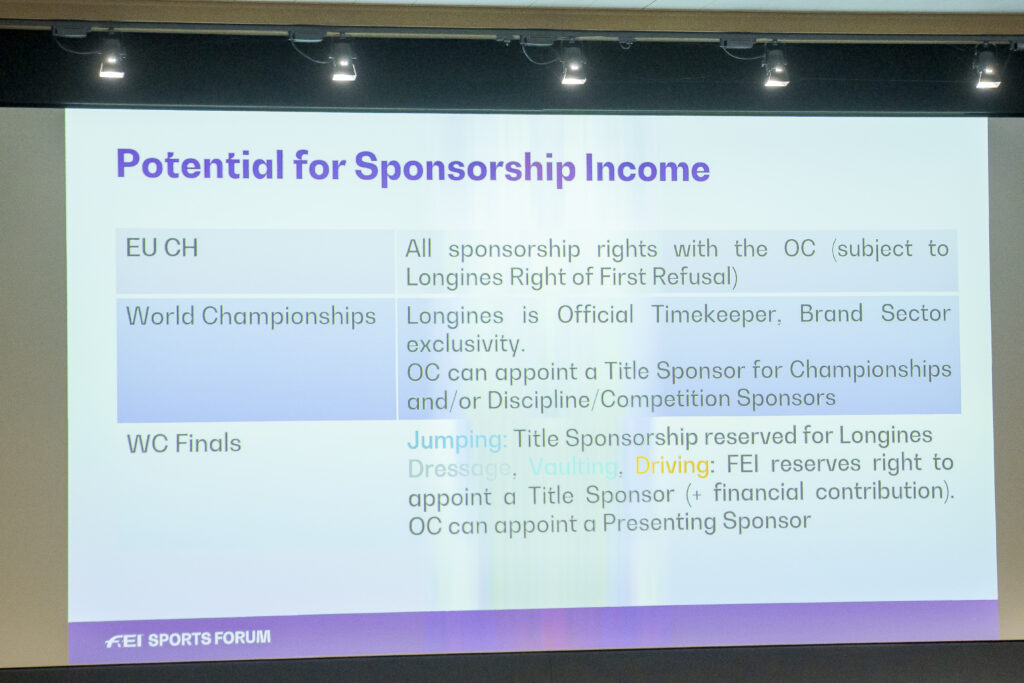 Potential for sponsorship is very differentiated between countries and OCs.
Potential for sponsorship is very differentiated between countries and OCs.
ECs are open for sponsoring, WC of all kinds belongs to Longines, WC Finals in other disciplines than jumping are open for a title sponsor and a presenting sponsor.
OCs can generate revenue for the championship through entry fees, which is a way to get some money back, but the number of participants will always be unknown until the closing date. This is a point of discussion and poses a risk for the OCs budget.
Other income can be public subsidies, support form the city/region, ticketing, corporate hospitality, food and beverage as well as a trade show.
Áine Power stated:
“The horse community comes to championships to spend money and shop”
Increasing cost levels may be behind as well as concerns for SLO-related backlash in media. Is it too difficult to plan or is the calendar so full that championships have lost their allure
Panel discussions
The panel discussion led by Tim Hadaway engaged the podium guests as well as the auditorium.
- Tim Hadaway (FEI HQ) – Director, Games Operations Moderator
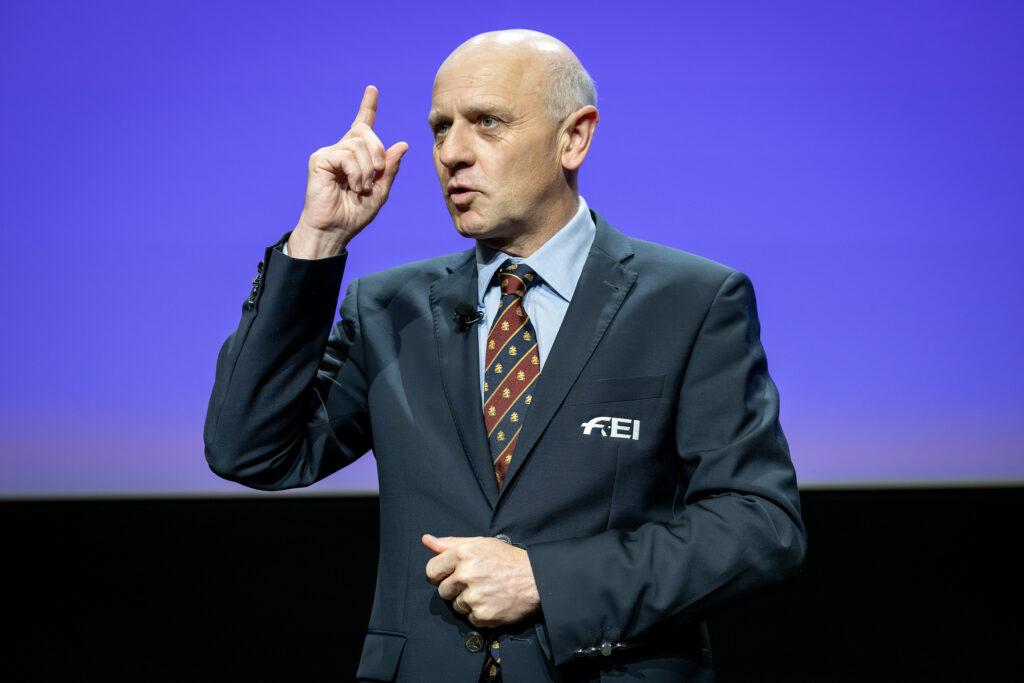
- Ralph Straus (FEI HQ) – FEI Commercial Director
- Simone Perillo – Secretary General, Italian Equestrian Federation (FISE)
- Michael Stone – President, Wellington International (WI)
- Casper Cassøe Krüth – Chief Operating Officer, Global Equestrian Group
- Nayla Stoessel – President, Longines CSIO St. Gallen, board member EEF
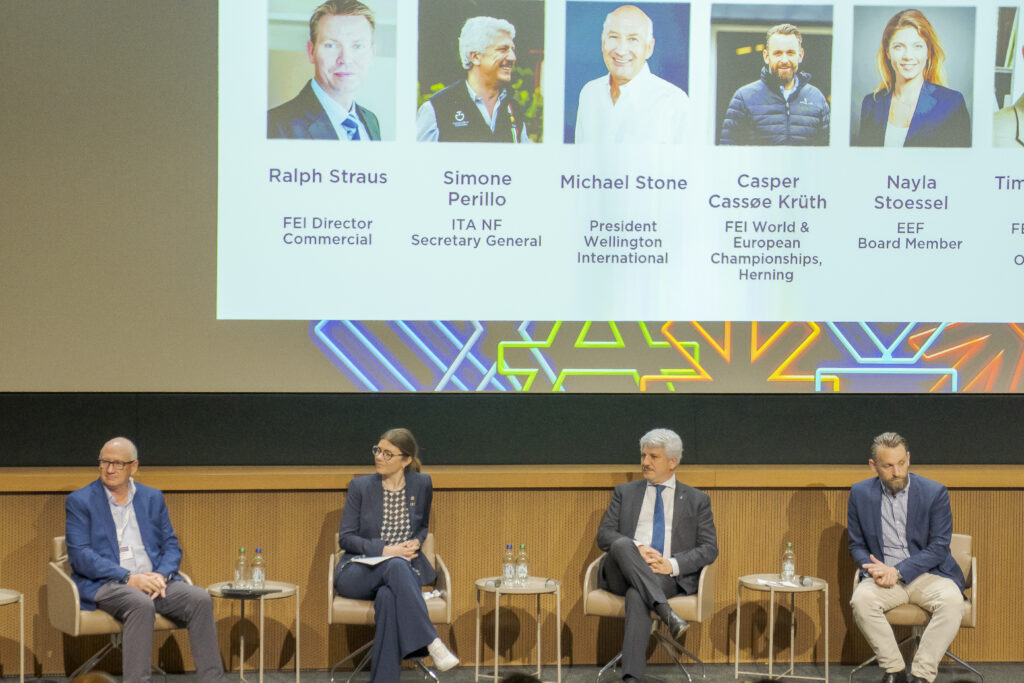
Are championships important and are the formats optimal
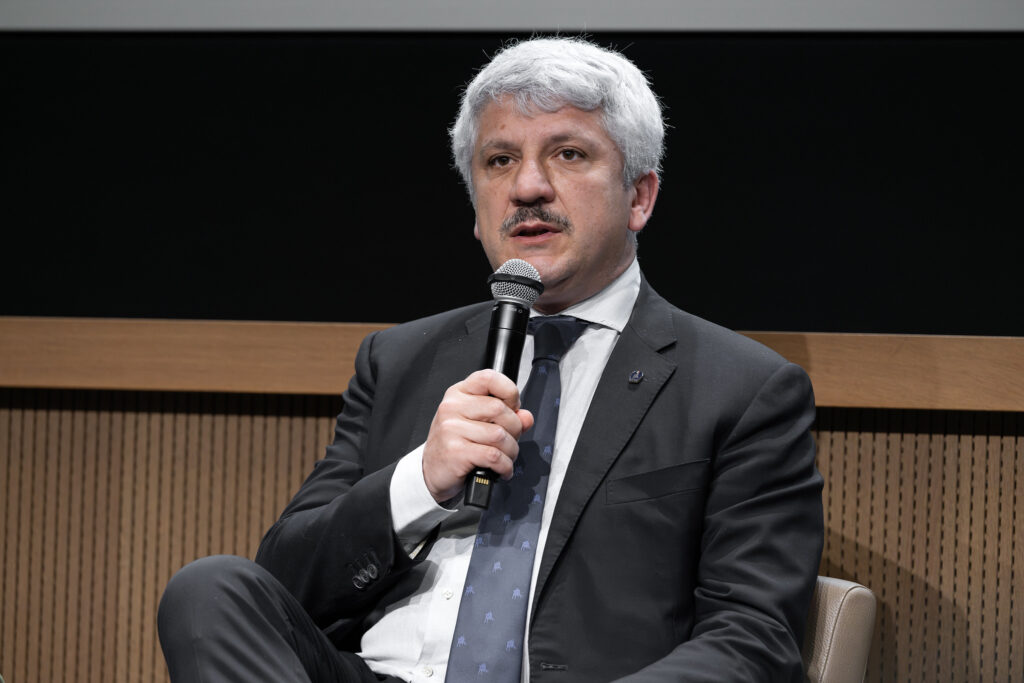
Simone Perillo: Championships are for the team sport, for the NFs. We had WC in Pratoni and were involved in EC in Milan. We managed to get funding from the government to restructure the venue in Pratoni. It enabled us to come forward and arrange more events in Pratoni 2024.
The costs for Milan was very very challenging and we need to look at the cost model. The prize money needs to be higher than a regular CSI, a true challenge. I have two roles, as an organizer and an NF representative.
We need to have another cost share model and FEI needs to share the risks. The fact that we have no bid for EC jumping in 2025 says it all.
The opportunities are still there, for NFs championships are crucial and our whole reason for existing. It helps to engage the grassroots and get new fans.
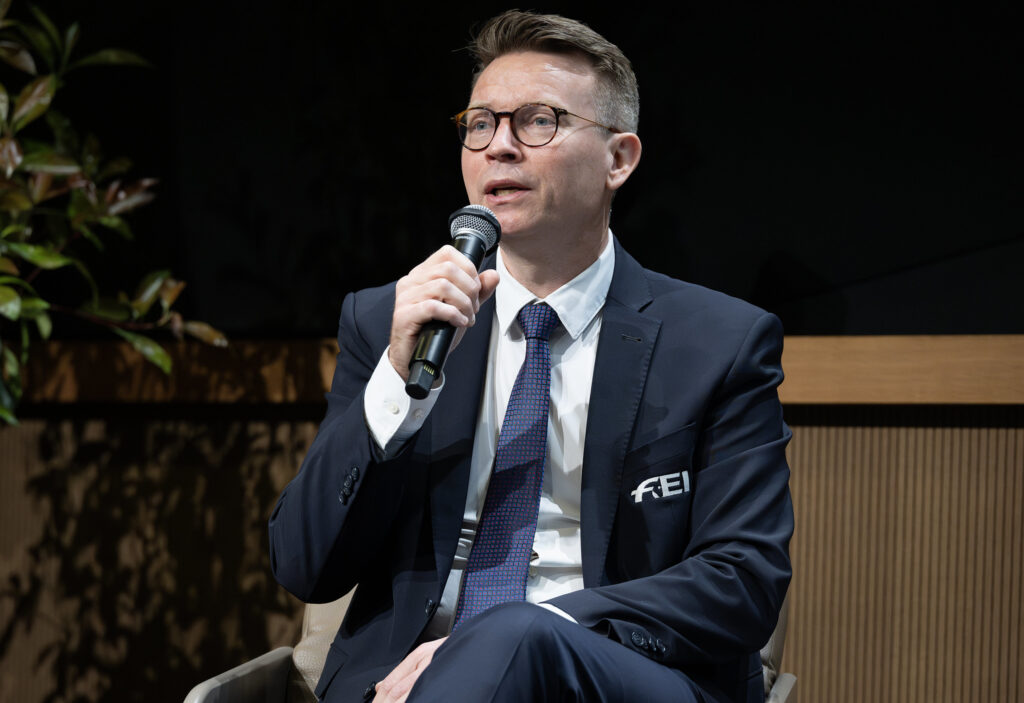 Ralph Straus: Championships are fundamental for the sport. It is not a revenue model, the FEI does not earn money on championships. What we gain is in the form of promotion in our many channels. The Olympic games help out, but the other championships plays a critical role in promoting the sport.
Ralph Straus: Championships are fundamental for the sport. It is not a revenue model, the FEI does not earn money on championships. What we gain is in the form of promotion in our many channels. The Olympic games help out, but the other championships plays a critical role in promoting the sport.
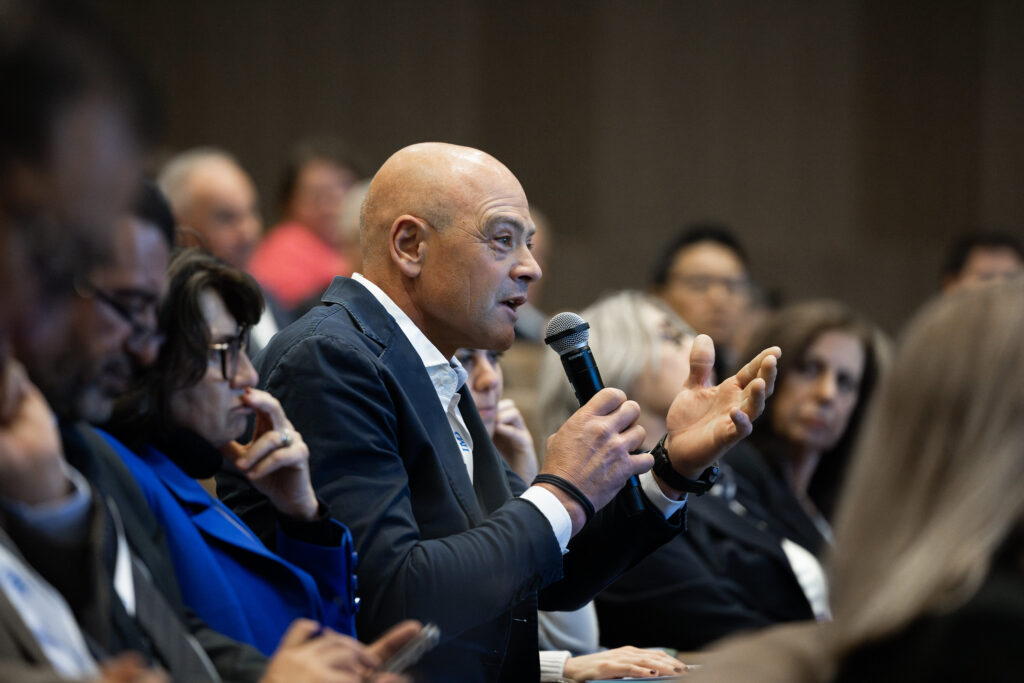
Comment from Francois Mathy, chairman of IJRC,
This is where the real sport happens, the best of the best. The proof is that before Milan the next week was Calgary but the best riders were in Milan. The EC is very important to gain experience ahead of WC and OC for example for younger riders.
Eleonora Ottaviani, IJRC
Money is not the driving factor. It is every rider’s dream to go to the Olympics. We urge FEI to appoint people to the OCs that are experienced in horse matters. Help check out the logistics early in the process. Previously many championships were handled by experienced horse people.
Riders must take care of their grooms’ accommodation, maybe the costs should be shared. After 30 years I have something to contribute so bare with me.
Michael Sorge, Swiss chef equipe jumping
We were at the ECs to win, it was not a qualifier for anything, everybody wanted to win a medal. We need both CSIOs and championships. For NFs championships are crucial, and they are equally important for riders. Money is not the driving factor.
Sönke Lauterbach, Secretary General GER
The general public basically only understands the championships, the rest is complicated, and we need them. The format with an unknown number of participants is a difficult factor to cater for.
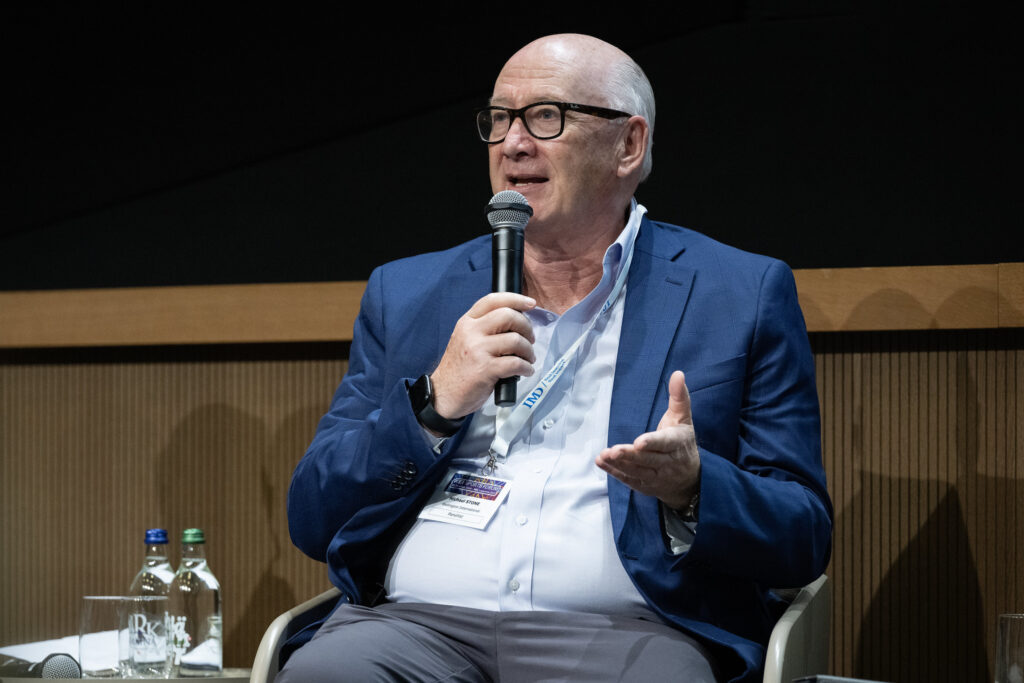
Michael Stone
We are trying to do two things at the same time, the event goes on and on because there are too many riders. If it is for development it is hard to be promotional at the same time. If it’s dressage the organizer has a death wish, not even enthusiasts watch it. The first two days are a way of getting to the end, the finals are the real action.
Casper Cassøe Krüth
The combination of jumping and dressage is a better one compared to involving para-dressage in terms of spectators. Going back to 2022 there are things we could have done differently, especially with the huge numbers of participants.
What drives interest in hosting Championships?
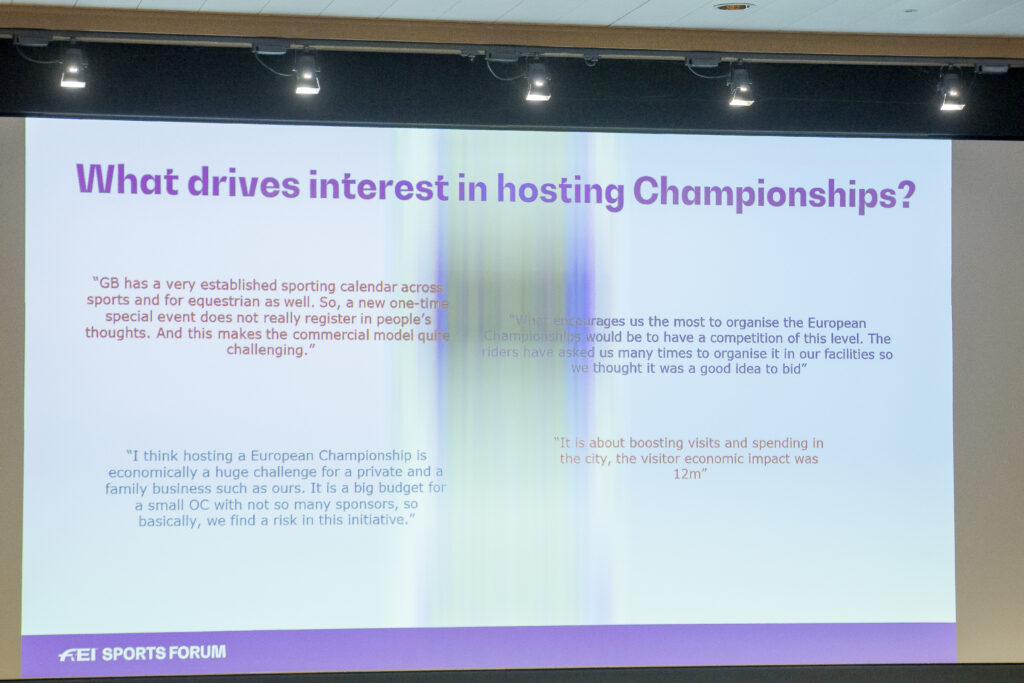
Casper Cassøe Krüth
Back in time, all of us are here for the horses, we do it because we love horses and the sport. Our main goal was to do the WC in Herning as the best one ever. We needed confidence and support from the City of Herning and Sport Denmark were crucial in succeeding. And we had a very good corporation at all times and for us, it was very important from the beginning that the city of Herning for the seven months without (reds not support from other parties) we couldn’t do anything so we really needed this support to do a good job.
Of our overall budget, 70 percent is commercial and we needed strong strong support from the beginning. We need time all the time we can get, we had two and a half years of preparation for this competition so we can agree with that.
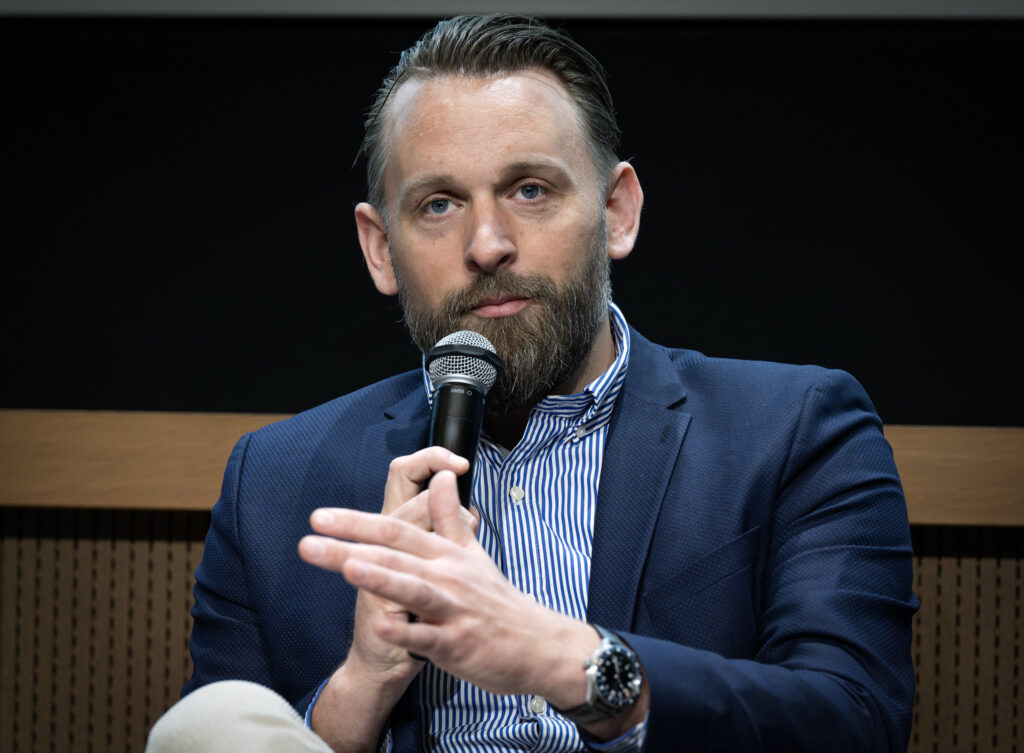
Lars Lindorf, Sport Denmark
I agree with Casper, Herning 2022 was a great success. We offered some contribution in terms of money and experience. The hard work and getting commercial sponsors was Casper and Jens TRabjerg. We are a small country and we like to host large events, it is a major goal for us. Herning 2022 was perhaps one of the biggest events we ever had, we also had Grand depart Tour de France the same year. WC Herning 2022 lived up to all our expectations, we would like to have it back again!
I think maybe the bidding process is the old days and the target dialogue is the future. In cycling, we do the dialogue. Slow down the old-fashioned bidding process and go into dialogue.
Nayla Stoessel
We need to look at our goals as an organization, it is to promote the sport, keep it as an Olympic discipline as well as keep the very unique parts of the horse.
I think this is an issue with the organizers, there are too many risks. The risks of today are hard to cover, you cannot insure yourself anymore like pandemic and weather risks are impossible to cover.
There could be more proactive work towards the organizers to support and back them up to strengthen them for a different scenario. The EEf is ready and willing to give more support. The hosting agreement does not fit everyone, organizers are very different.
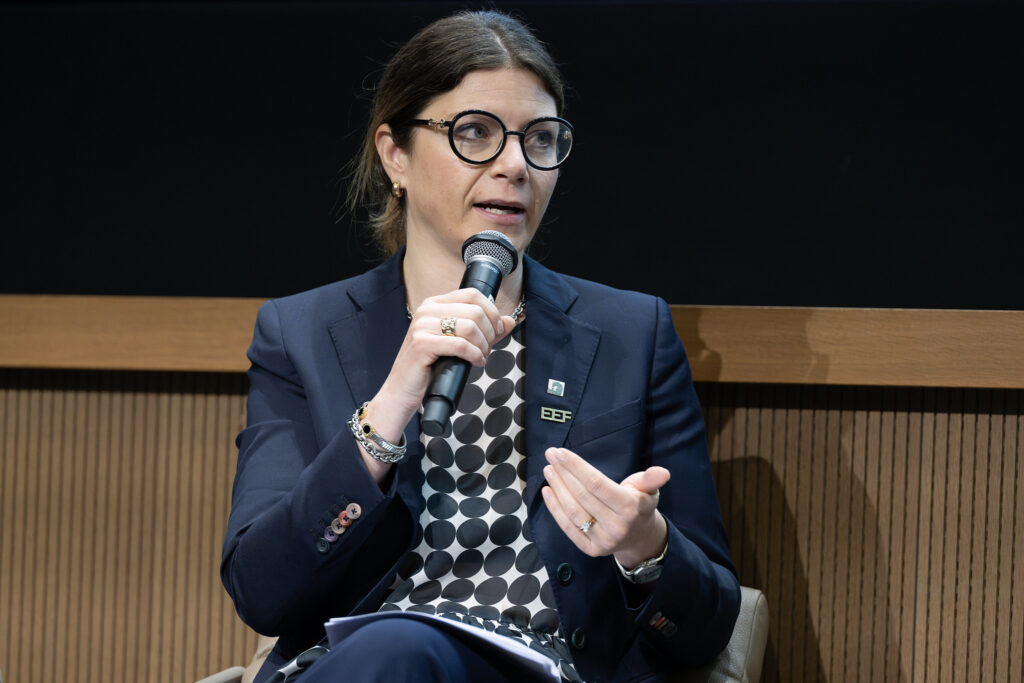
Daniela Garcia, secretary general for Panam and Mexico
It is also a business, it needs to make money. Paying for meals and accommodation is very 90’s and outdated. We know that riders do not stay at the OCs hotel and do not eat the meals offered. It is too much money to go down the drain. The prize money is not the driving force, not on our side of the Atlantic. Brazil were already qualified for the Olympics and still sent their best team.
Additional requirements and costs
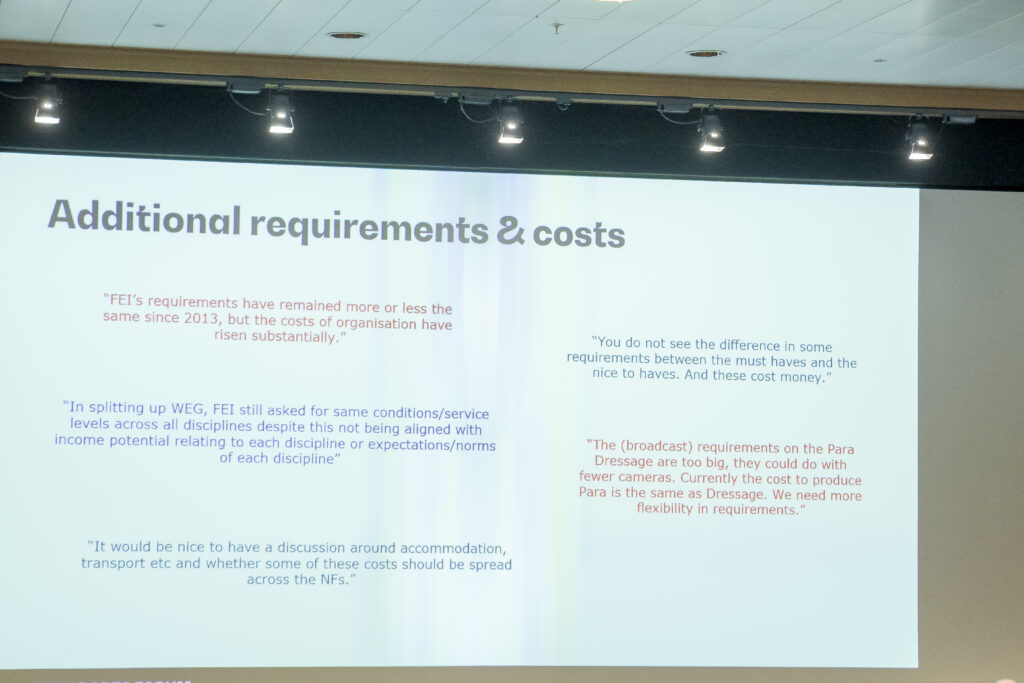
Michael Stone
The cost of hosting so many people and getting a host broadcaster. It is so many extra people that it costs a lot. The FEI people delivered and helped us out a lot in Ocala. The hosting fee is probably outdated at this stage. The NFs need to contribute financially to championships, they do not really do that today.
Jerry Ta from HongKong NF
We have heard a lot of the top events, I think we need to take a look at the minor events as well. We had Asian Games in 2019 and we will have it again in 2025. It is a very costly event to arrange championships where most riders fly in from Europe as they are based in Europe. We as sports managers know we are going to loose money but we just have to take care of not losing too much. We need the games to sustain the sport. There should be some leeway for developing countries. The rules should not be as rigid as a full EC.
The rules are all designed around the European base, for Asia it needs to have more flexibility.
Simone Perillo
The WEG is a fantastic model but is not financially viable. In Italy jumping funds everything else. The target is really how to save the championships. We do not want to take the route of tennis where the big championships are organized by individual organisations.
OCs are paying every week fees for their competitions, instead, everybody needs to invest. FEI needs to be a partner and share risk.
Joyce, CHIO Rotterdam, responding to a question about organizing an EC again as in 2019.
We are definitely not hosting ECs anymore. We had jumping, dressage, and para in 2019. We suffered a loss and we will stay on with our current CSIO/CDIO competitions. Our board is not that keen to go on board again.
Casper Cassøe Krüth about upcoming obstacles in the preparation process
Yes, we had a lot of surprises during our planning process. We need to look over the accommodation and meals, organizing the hotels, booking for athletes and only 50 percent is used. I believe our European NFs can carry the cost for the riders and horses. 75 percent of the riders are in for the first two days and will then leave but we will have to pay for several days.
Sönke Lauterbach, secretary general for Germany, responding to Casper
Not all federations get government funding, we have a lot of championships to go to. We and many others do not have government funding so I would not agree that we can pay our own costs for all the many championships.
Sabrina Ibanez, Secretary General of the FEI
What about capping the numbers, having a qualification for the championships? We were discussing it, I know it is not a popular thing..
Casper Cassøe Krüth responding to Sabrina
It is a really good idea because it makes everything sharper from the start.
Ralph Strauss, on broadcast costs
We have come a long way. The requirements for broadcast have been adapted for championships. There needs to be high quality for SVT and others. The whole media-rights situation has changed, nowadays they seldom pay for the rights. It is still an important part. Linear TV is still important, but percentage-wise it has decreased. Live -streaming is increasing. There needs to be a minimum quality. Through the broadcast agreements we look at what makes sense and try to adapt.
We are working with Longines to produce more comprehensible productions with graphics and augmented reality. The top-competitions we need to keep a quality that is engaging and promotional.
The revenue from broadcast rights does not cover the cost of our content production. We keep doing it for the sake of the relationship with the partners. FEI takes some costs behind the scenes but we could take another look at this whole situation
Casper Cassøe Krüth on problems with live-streaming
We need to sell tickets, to have full house, we pay a lot of money for broadcasts. People are getting more lazy and stay at home and watching the two riders on live stream – this does not build huge sports events. The live-streams are becoming more and more of a problem. Before we signed the host agreement we had our sponsor etc. The Longines contribution caused a bit of difficulty because the FEI was in between.
Ralph Strauss, on live-stream
We know that live-stream does not contribute revenue. When we have a linear contract it is usually exclusive. We can only get FEI-tv behind a pay wall in those contracts. We are still depending on national broadcasts to promote the sport.
The broadcasters do not want the thousand videos on So Me sent out. The athletes get the clips from Socalie.
Bid process – engaging or discouraging
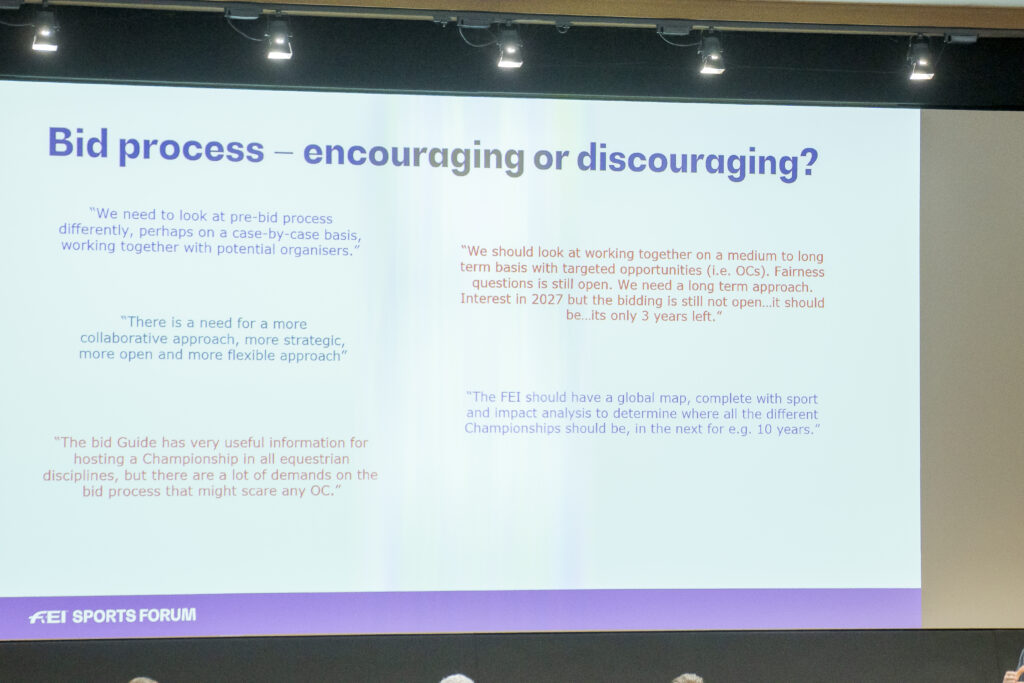
Simone, Italian NF
The bid process allows for transparency and objective but the bidding needs some more flexible. The conditions need to seriously revised. We could have regional qualifiers leading up to a final. The model needs to be completely changed.
Victoria from Belgium NF,
From a nation that is considering bidding in the future, it would be interesting if other previous bidders could share their documentation. When you consider bidding we have no knowledge about other countries in the process of bidding. It should be a more open pre-process. It is a short time-frame to create the full sheet of financials secured over summer.
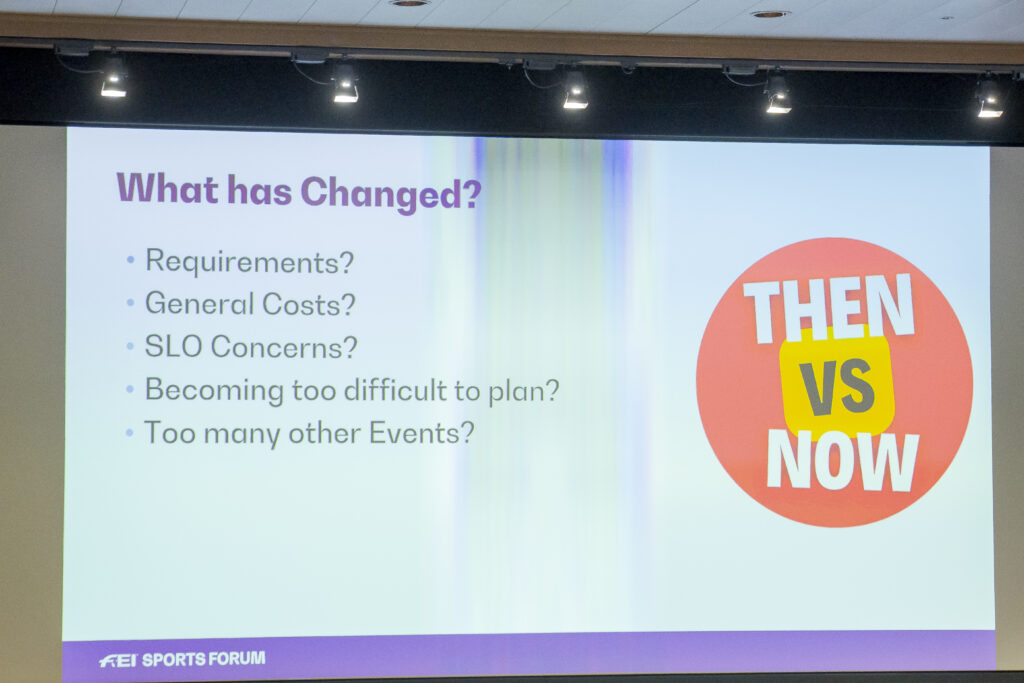
Áine Power concluded the session.
“What really came through today is that championships are something special. We already had that feeling, anyone who’s been at a championship, knows they’re special, but it was really heartening, I think, for us to hear it from the athletes and the organizers and the federations. We want championships, we want major championships, we don’t want less championships, so that message really came through loud and clear. From the FEIs’ perspective, we are completely open to being flexible and we are completely open to negotiation.
At the same time, we do not have a magic blank checkbook, so we cannot pick up the cost of no hosting fee and pick up all the costs for all those broadcasters.”
And the core players of all championships – the riders – were sadly totally missing in the discussion.

